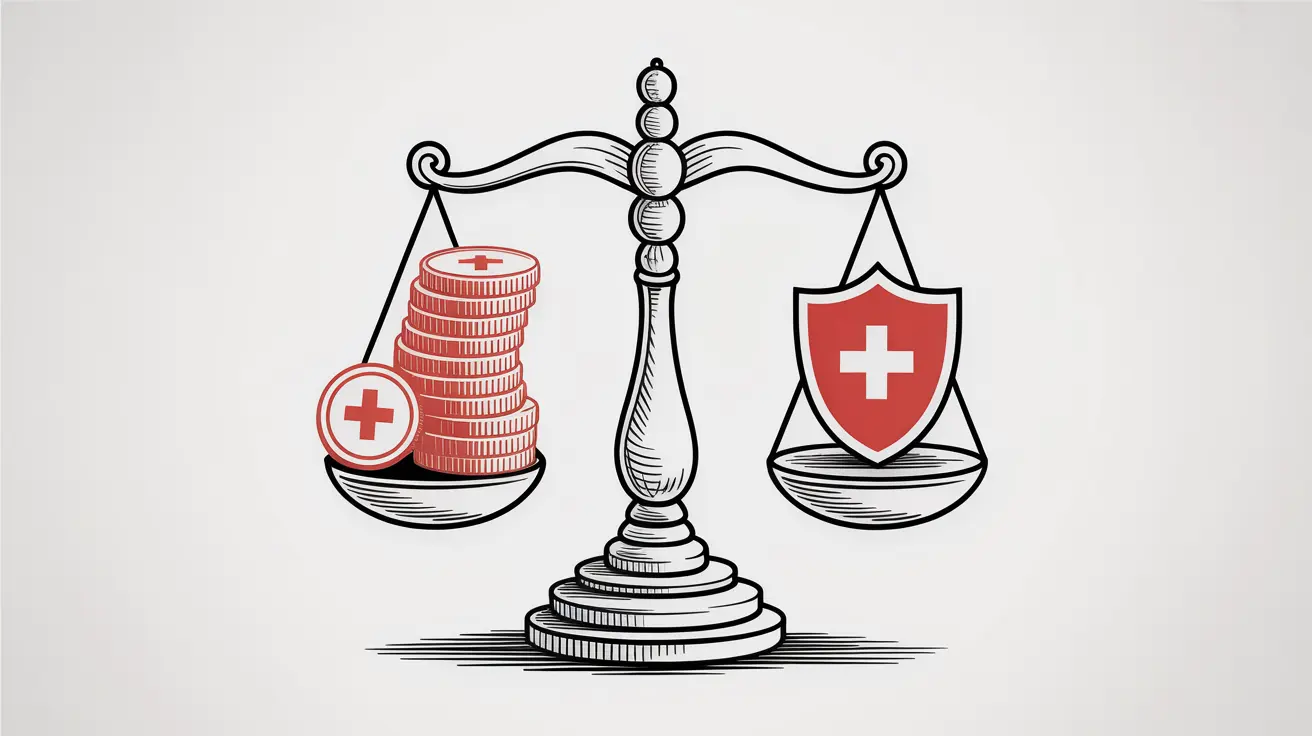
The Price of Peace of Mind: Comparing Swiss Health Insurance Deductibles & Cost-Saving Models for Expats (2025 Deep Dive)
Key Facts — Deductibles & Models (2025)
- Adult deductibles: CHF 300–2,500; co‑pay 10% up to CHF 700 (CHF 350 kids)
- Model savings vs Standard: GP ~10–15%, HMO ~15–25%, Telmed ~10–20%
- Break‑even depends on expected medical spend; compare total annual cost
- High deductible works best if you rarely claim and can cover CHF 2,500 out‑of‑pocket
- Seasonal: switch or change deductible/model by 30 Nov for 1 Jan 2026
The Price of Peace of Mind: Comparing Swiss Health Insurance Deductibles & Cost-Saving Models for Expats (2025 Deep Dive)
For expatriates in Switzerland, understanding and managing health insurance costs is a significant financial consideration. Beyond the monthly premium, the choice of deductible (Franchise) and the type of insurance model (e.g., Standard, Telmed, HMO, GP) are key levers that can dramatically impact your overall annual healthcare expenditure and your access to medical services. This article provides a deep dive into these concepts, helping you compare options and make informed decisions to balance cost and coverage effectively in 2025.
Understanding the Swiss Health Insurance Cost Structure
Before comparing models and deductibles, it’s crucial to understand the main components of Swiss health insurance costs:
- Premiums: The fixed monthly amount you pay to your insurer for your basic mandatory health insurance (LAMal/KVG) and any supplementary plans (LCA/VVG).
- Deductible (Franchise): This is the annual amount you must pay out-of-pocket for eligible medical expenses before your basic health insurance starts to cover the majority of costs. For adults, the standard deductible options range from CHF 300 (lowest) to CHF 2,500 (highest).
- Coinsurance (Selbstbehalt): Once your annual deductible is met, you typically still pay 10% of subsequent medical costs, up to an annual maximum of CHF 700 for adults (CHF 350 for children). For some medications, the coinsurance can be 20% if a cheaper generic equivalent is available and not chosen.
- Hospital Contribution: For inpatient hospital stays, there is a daily contribution of CHF 15, with no annual limit (this does not apply to children or young adults up to 25 in education, nor for maternity-related stays).
These elements interact to determine your total out-of-pocket healthcare expenses each year.
Choosing Your Deductible: A Strategic Decision for Expats
The higher your chosen deductible, the lower your monthly premium will be – and vice versa. The decision involves balancing predictable monthly costs against potential larger out-of-pocket expenses if you need significant medical care.
Low Deductible (e.g., CHF 300):
- Pros: Lower out-of-pocket expenses when you first access medical care. More predictable costs if you anticipate regular doctor visits or medication needs.
- Cons: Higher monthly premiums.
- Good for: Expats with known health conditions, those who prefer to minimize upfront costs per medical event, or families with young children who frequently visit the doctor.
High Deductible (e.g., CHF 2,500):
- Pros: Significantly lower monthly premiums, leading to substantial savings if you remain healthy and rarely need medical care.
- Cons: You must be prepared to pay up to CHF 2,500 (plus coinsurance) out-of-pocket if you have significant medical expenses.
- Good for: Healthy expats who rarely consult doctors, have a financial buffer to cover the high deductible if needed, and are comfortable with taking on more financial risk in exchange for lower fixed costs.
Factors for expats to consider: Your current health status and medical history, your risk tolerance, your cash flow and savings (can you comfortably pay the full deductible if necessary?), and the anticipated length of your stay in Switzerland.
Comparing Cost-Saving Insurance Models
Beyond the deductible, the choice of insurance model for your basic coverage significantly impacts both your premium and how you access healthcare. Here’s a look at common models, illustrated with how providers like Assura, Sanitas, CSS, or KPT might approach them (note: specific model names vary by insurer):
Standard Model (Free Choice of Doctor)
- How it works: You have the freedom to consult any doctor or specialist directly without needing a referral. This is the most flexible but also the most expensive model.
- Cost Implication: Highest premiums.
- Expat Suitability: Ideal for expats who prioritize maximum flexibility, have established relationships with specific doctors, or frequently need to see specialists without prior consultation.
Telmed Model (Telemedicine First)
- How it works: You must first call a designated telemedicine hotline for a medical consultation before being referred to a physical doctor or specialist (exceptions often apply for emergencies, gynecological check-ups, and eye care).
- Cost Implication: Lower premiums, often 10-20% less than the Standard model.
- Expat Suitability: A good option for tech-savvy expats comfortable with phone or video consultations, seeking premium savings, and okay with a guided care pathway. Crucially, ensure the telemedicine service offers support in English if needed.
HMO Model (Health Maintenance Organization)
- How it works: You choose a specific HMO center or a network of doctors affiliated with the HMO. Your chosen HMO doctor (or a doctor within the center) acts as your gatekeeper, providing initial care and referring you to specialists within the network if necessary.
- Cost Implication: Significant premium savings, potentially up to 25% less than the Standard model.
- Expat Suitability: Suitable for expats seeking coordinated care and lower premiums, provided there is an HMO center with good English-speaking doctors conveniently located. Choice of specialists is usually restricted to the HMO network.
Family Doctor / GP Model (Hausarzt)
- How it works: You choose a registered Family Doctor (GP) from the insurer’s list to be your first point of contact for all health issues. This GP coordinates your care and refers you to specialists when needed.
- Cost Implication: Lower premiums than the Standard model, often 5-15% less.
- Expat Suitability: A good choice for expats who prefer a consistent relationship with a personal GP and want premium savings. Finding an English-speaking GP within the insurer’s approved list is key.
Calculating the Break-Even Point: How Expat Savvy Can Help
Determining the most cost-effective combination of deductible and model isn’t just about finding the lowest premium. You need to estimate your potential total annual costs (Monthly Premiums x 12 + Deductible + Max Coinsurance) under different scenarios of healthcare usage.
For example, someone expecting low medical costs might save significantly with a CHF 2,500 deductible and a Telmed model. However, if they unexpectedly incur CHF 3,000 in medical bills, they’d pay CHF 2,500 (deductible) + CHF 50 (10% of the remaining CHF 500) = CHF 2,550, plus their lower annual premiums. Someone with a CHF 300 deductible would pay CHF 300 + CHF 270 (10% of CHF 2,700) = CHF 570, plus their higher annual premiums.
Expat Savvy Insight: These calculations can be complex. Expat Savvy advisors can help you perform a personalized cost analysis based on your health profile, anticipated medical needs, and risk appetite.
Frequently Asked Questions (FAQ) on Cost Optimization
Q1: Can I change my deductible every year?
A1: Yes, you can change your deductible for your basic health insurance once a year, effective from January 1st. You must inform your insurer by the specified deadline (usually end of November, but check with your insurer).
Q2: What happens if I choose an HMO model and need a specialist not in their network?
A2: Generally, care from specialists outside the HMO network is not covered, or only covered in emergencies or with a specific referral approved by the HMO and insurer. Always clarify these rules.
Q3: Are Telmed consultations available in English with all providers?
A3: Most major insurers offering Telmed models ensure their telemedicine partners provide consultations in English, but it’s a crucial point to verify before choosing such a plan.
Q4: Is it always cheaper to choose a high deductible if I am young and healthy?
A4: While it often results in the lowest total annual cost if you have minimal medical expenses, it’s a gamble. An unexpected illness or accident could lead to high out-of-pocket costs. Ensure you have the financial means to cover the full deductible if needed.
Q5: How can Expat Savvy help me choose the most cost-effective insurance model and deductible?
A5: We analyze your individual situation, explain the pros and cons of each model and deductible level in your context, help you estimate potential total costs, and compare offers from different insurers to find the optimal balance of cost and coverage for you.
Conclusion: Smart Choices for Your Swiss Health Insurance Budget
Understanding how deductibles and insurance models work is fundamental to managing your health insurance costs effectively as an expat in Switzerland. By carefully assessing your health needs, risk tolerance, and budget, and by comparing the options intelligently, you can make choices that provide both peace of mind and financial prudence.
For personalized advice on optimizing your health insurance costs, contact us at Expat Savvy.
Compare specific provider offerings on our Hub Page:
Rate this article

Benjamin Amos Wagner
Founder of Expat Savvy